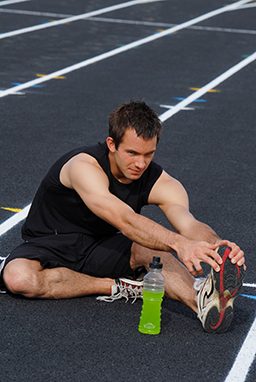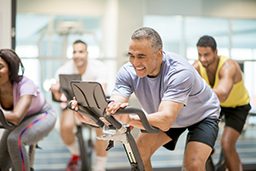When planning an effective fitness program, it is important to separate fact from fiction. Fitness folklore spreads quickly because many people are drawn to promises of magical quick fixes. The reality is that fitness is a way of life. A surefire path to success includes proper nutrition, hydration, sleep and exercise, all incorporated into your daily life. You should make time for these things each day just as you manage to find time to shower, brush your teeth and eat.
Drinking cold water during or after exercise is bad for you. — Myth
Cold water has actually been shown to be absorbed more quickly, so it can effectively rehydrate the body during or after exercise. An additional benefit of cold water is body-temperature regulation, which is particularly important on hot days. Hydration is the priority, and the water temperature is secondary. If you are freezing following a dive, drink warmer water. If you are sweating topside, drink cooler water. Pay attention to how you feel, and ingest fluids according to your thirst.
There is no benefit to a short workout. — Myth
One of the largest barriers to exercise is time. Therefore, any amount of time that you can squeeze in some physical activity is beneficial. The greatest health benefits of exercise are shown between inactivity and some activity. In other words, every step counts. Three 10-minute workout sessions are just as beneficial (if not more so) than a single 30-minute session.

If you are working out, you need a sports drink. — Myth
A tendency to drink sweet beverages when exercising places many exercisers (especially new exercisers) in a positive caloric balance, which leads to weight gain (fat not muscle). A typical 32-ounce Gatorade contains 200 calories and 56 grams of sugar. If you consumed the whole bottle you would need to run at least two miles to break even. A good rule of thumb is that if an exercise session does not exceed 90 minutes in duration, water should be your drink of choice.
Sit-ups and crunches eliminate belly fat. — Myth
There is no factual basis for spot reduction of body fat. Sit-ups and crunches will firm up muscles that lie under the fat, but there is no connection between this muscle development and local fat cells. The only way to reduce body fat is to burn more energy than you store. Unfortunately, where you lose and gain weight first is genetically determined. Feel free to blame your parents. Sit-ups and crunches target very specific muscles and are not high energy expenders. So I am sorry to say that these exercises will not do much to improve your overall body composition or eliminate that extra weight around your middle.
Weight gain can be caused by lack of sleep. — Fact
Have you ever found yourself eating more when you are tired? This behavior is not because of a personal lack of control, but rather there is a physiological basis for it. Lack of sleep creates a hormone imbalance: The levels of the hormone leptin (which tells your body to stop eating) fall, while levels of ghrelin (which makes you think you are hungry) rise. Have you noticed that you choose high-carb, high-sugar foods when you are tired? This is because the brain runs on glucose, the simplest form of sugar. When the brain is tired, it wants sugar. This combination of increased caloric intake in the form of high-sugar foods leads to weight gain. Proper sleep is vital to maintaining caloric balance and having energy for exercise.
You have to stay in the “fat-burning zone” to burn fat. — Myth
Many exercise machines indicate that low levels of exertion are considered the “fat-burning zone.” It is true that as much as 90 percent of your energy at this low level is fueled by fat. But keep in mind that the rate at which calories are burned will be low — 90 percent of a little is still a little. Would you rather have someone give you 90 percent of $1 or 25 percent of $100? When exercising at higher intensities, a smaller percentage of your activity is fueled by fat, but the total calories burned at that higher intensity will be much greater than during a low-intensity workout of the same duration.

Exercise improves brain function.— Fact
Pay attention to your productivity. I have found solutions to many work and personal challenges following an exercise session. Brain scans have shown that exercise boosts blood flow to the brain and increases brain activity. An additional benefit of exercise is neurogenesis, the building of new brain cells and new connections between brain cells. Yes, exercise can make you smarter.
It doesn’t matter how you fared in this test of fitness folklore. By simply reading this article you are now better informed about some common misconceptions about exercise. Keep in mind that everything you hear at the gym isn’t necessarily true. Consider the science behind the statements, and remember that much advice is well intentioned and framed in partial truths. There is no magic bullet for wellness.
Note: To avoid an increased risk of decompression sickness, DAN® recommends that divers avoid strenuous exercise for 24 hours after making a dive. During your annual physical exam or following any changes in your health status, consult your physician to ensure you have medical clearance to dive.
© Alert Diver — Q3 Summer 2016